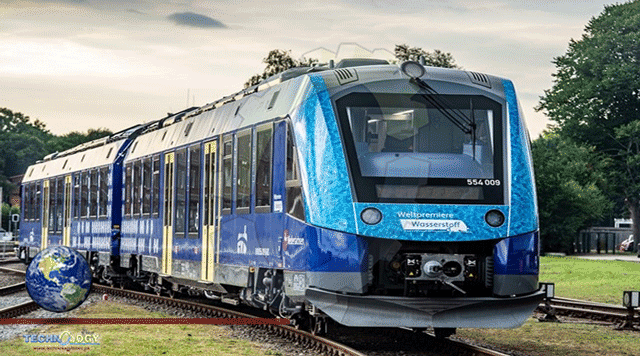A fleet of 14 hydrogen-powered trains is replacing diesel units on the 100km (60 miles) of track connecting the cities of Cuxhaven, Bremerhaven, Bremervoerde and Buxtehude near Hamburg.

Germany’s inauguration of a railway line powered entirely by hydrogen has been hailed as a “world premiere” and a significant step forward for green train transport.
The fleet, which cost £93m (£78m), is expected to prevent 4,400 tonnes of CO2 from being released into the atmosphere each year, according to regional rail operator LNVG.
The trains were provided by French industrial giant Alstom and are described as a “zero emission” mode of transport. Each of the trains has been fitted with a fuel cell, installed on its roof, which allows them to mix hydrogen on board with oxygen present in the ambient air, producing the electricity needed to pull the train.
Other partners in the project are the Elbe-Weser railways and transport company (evb) and the gas and engineering company Linde, which is providing the hydrogen refuelling facility.
“Whatever the time of day, passengers will travel on this route thanks to hydrogen”, Stefan Schrank, project manager at Alstom, told AFP.
Hydrogen trains have long been considered a promising solution to the need to decarbonise the German rail sector. They are particularly attractive on short regional lines where the cost of electrification outstrips the profitability of the route.
Currently, 20 per cent of the Germanys’ train journeys – and one out of every two regional ones – are fuelled by diesel.
The conversion of this line to entirely hydrogen-powered operation has for this reason been hailed as a “trailblazer” in the sector.
Alstom says that itsCoradia iLint trains are the world’s first passenger trains to run on a hydrogen fuel cell that generates electrical energy for propulsion.
Although commercial trials with Coradia iLint regional trains have been carried out since 2018, this marks the first instance of a full hydrogen-powered fleet in passenger service. The project drew investment of “several tens of millions of euros” and created jobs for up to 80 employees in the two countries, according to Alstom.
The project has caught the attention of other European nations, with Alstom having signed contracts build nearly 60 trains for Germany, France and Italy.
“By 2035, around 15 to 20 per cent of the regional European market could run on hydrogen,” Alexandre Charpentier, rail expert at consultancy Roland Berger, told AFP.
Germany announced in 2020 an ambitious seven-billion-euro plan to become a leader in hydrogen technologies within a decade. As a result, “between 2,500 and 3,000 diesel trains could be replaced by hydrogen models”, Schrank estimates.
Earlier this year German train-builder Siemens Mobility secured a contract to supply seven two-car hydrogen trains for a line in the Berlin-Brandenburg region.
However, hydrogen is not necessarily carbon-free, as as much as 95 per cent of it is derived from the transformation of fossil fuels. Only green hydrogen, produced using renewable energy, is considered sustainable by experts.
Source: eandt